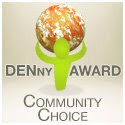skip to main |
skip to sidebar
http://bit.ly/no-cursive-in-core
Cursive isn't a required standard for students in the new Common Core
State Standards for English, which Georgia and 40 other states
adopted last summer. Teachers and administrators from across GA will
meet in March to decide whether to amend the standards and retain
cursive writing, which is already in serious decine."A lot of my
students over the years have stopped being able to read cursive
writing," says middle grades ELA teacher Ellen Jackson. "I have to
make sure to write in print because they can't read it otherwise."
ALSO: here's a teacher chat about the pros and cons:
http://bit.ly/tln-cursive
~~Hope this Helps!
~~GB
http://bit.ly/day-without-chemistry
A new short animated video from the American Chemical Society is
getting some buzz - a very clever conversation starter about the role
chemistry plays in everyday life. Alas, the ACS loaded the vid on
YouTube and it's been crashing against school firewalls since. To the
rescue, the Daring Librarian of Murray Hill Middle School, who not
only posts the 90-second clip on her blog but tells how she leaped
the firewall to do it. Ridiculous, isn't it? These teachers think so:
http://bit.ly/tm-firewall
~~Hope this Helps!
~~GB
http://bit.ly/haiku-boys-guyku
Middle-school librarians and Booklist bloggers Cindy Dobrez and Lynn
Rutan enthusiastically review "Guyku: A Year of Haiku for Boys"
written by Bob Raczka and illustrated by Peter H. Reynolds. The
book's website features animated haikus submitted by readers and
activity sheets for teachers. http://bit.ly/guyku The site also
welcomes girls, who want to know: "What about us?!"
http://bit.ly/galsku
~~Hope this helps!
~~GB
Common Sense Media has launched a new version of its free digital citizenship curriculum, Digital Literacy and Citizenship in a Connected Culture. The new version adds student, teacher, and parent resources, including comprehensive lessons on cyber bullying, for fourth and fifth graders. The program, which empowers students to think critically and make informed choices about how they live and treat others in today’s digital media world, covers topics from internet safety and security to privacy, with a deep focus on cyber bullying and responsible digital behavior. Recent stories of the tragic consequences of cyber bullying highlight the need to teach kids how to prevent and respond to digital harassment, beginning at a young age, Common Sense Media says. The curriculum, which is based on the digital ethics research of Howard Gardner and the GoodPlay Project at Harvard’s Graduate School of Education, uses content that ranges from print and video materials to interactive components and real-life student stories to inspire kids to be responsible digital citizens.
http://www.commonsensemedia.org/educators
~~Hope this Helps!
~~GB











